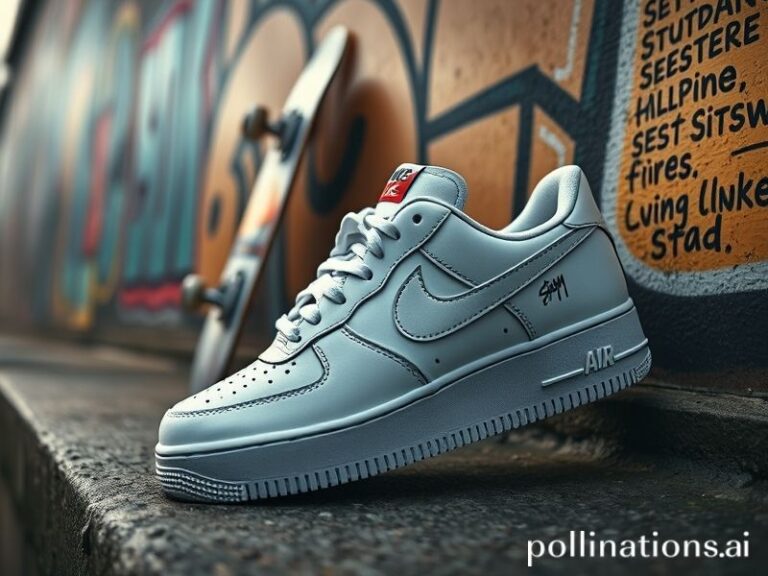Chris Pratt: The Unlikely Soft-Power Superhero Uniting a Fractured Planet
Dispatch from the Global Giggleplex: Chris Pratt as the Planet’s Punchline-in-Chief
By Dave’s Locker, International Affairs (and Occasional Existential Dread) Desk
Somewhere between the first Avengers box-office billion and the fifteenth Jurassic sequel, Chris Pratt evolved from genial sitcom sidekick to a geopolitical constant—like climate change, but with better teeth and a dedicated meme department. From Ulaanbaatar to Uberlândia, the man’s face is now as inescapable as microplastics in baby formula. How did a Minnesota-born goofball become a soft-power export on par with Korean e-sports and German weaponized fiscal policy? Strap in; the answer is more depressing than you think.
First, observe the Pratt Supply Chain. His films are shot in Vancouver, scored in London, digitally buffed in Mumbai, and pirated within minutes in Lagos. Each link keeps thousands of underpaid creatives awake at 3 a.m., re-adjusting the color saturation on Pratt’s biceps so that Jakarta’s multiplexes can project maximum escapism. Hollywood calls this “vertical integration”; the WTO files it under “services surplus.” The rest of us call it Tuesday.
Meanwhile, the Chinese box office—population 1.4 billion and at least three conflicting censorship manuals—has anointed Pratt its favorite non-threatening white dude. His characters punch aliens, not tariffs, which dovetails nicely with Beijing’s current “no politics, only popcorn” directive. When The Tomorrow War skipped theaters for Amazon Prime, Chinese social media mourned like it had lost a panda. The Communist Youth League even tweeted a Pratt GIF captioned “Time travel responsibly.” If that isn’t cultural détente, what is?
Europe, naturally, overthinks the whole affair. French critics parse Pratt’s on-screen religiosity like medieval theologians dissecting angels on pinheads. German talk-show hosts grill him about his hunting hobby with the same furrowed intensity once reserved for questions about America’s missile placements. Pratt responds with aw-shucks affability, thereby confirming every continental suspicion that sincerity itself is a psy-op. The EU Parliament briefly considered a Pratt Directive—mandating trigger warnings for heteronormative dinosaur dads—but it died in committee next to the proposal to ban straws.
Down south, Latin American audiences have turned Pratt into a folk saint of chaotic good. In São Paulo’s favelas, bootleg murals depict Star-Lord cradling a soccer ball instead of an Infinity Stone, offering absolution for petty theft and late child-support payments. Argentine economists, desperate for any good news, note that Pratt’s films track positively with brief spikes in popcorn sales and, by extension, taxable concessions. The IMF has not commented, but insiders say the next standby agreement may include a clause for discounted Guardians 3 tickets.
Africa’s streaming boom—courtesy of Chinese-built 4G towers and Musk’s orbiting routers—means Pratt’s grin now flickers across cracked smartphone screens from Lagos to Lalibela. Kenyan Uber drivers quote Guardians dialogue at traffic cops; Senegalese wrestling promoters nickname rookie heavyweights “Chris Pratton.” It’s soft power by osmosis, cheaper than building embassies and less flammable than oil pipelines.
Even the Arctic isn’t safe. Norwegian researchers stationed on Svalbard report that their Friday movie night—inevitably a Pratt vehicle—boosts morale enough to offset seasonal depression and the slow realization that the permafrost is belching methane like a frat boy after Taco Tuesday. Forget NATO; apparently what the North needs is Pratt in 4K.
And yet, beneath the planetary group hug lurks the same grim irony that shadows every modern marvel: the more universally beloved Pratt becomes, the more atomized we all are. His films preach teamwork while financed by multinational corporations that treat labor laws like optional speed bumps. His wholesome persona is algorithmically A/B tested until it maximizes dopamine across every demographic slice. Somewhere, a data scientist in Singapore is tweaking Pratt’s smile by 0.3 millimeters to improve click-through in the 18-24 Malay female cohort. We are not audiences; we are training data.
Still, you have to admire the efficiency. In an era when diplomacy is conducted by tweet and trade wars erupt over breakfast, Pratt remains the one export both dictators and democracies can binge without triggering a sanctions package. That, dear readers, is the final punchline: the world can’t agree on carbon limits, debt restructuring, or basic human rights, but we’ve unanimously ratified the star-spangled charm of a guy who once played Andy Dwyer. If that doesn’t prove the species is doomed, it at least confirms we’ll go out laughing—probably at a blooper reel.







